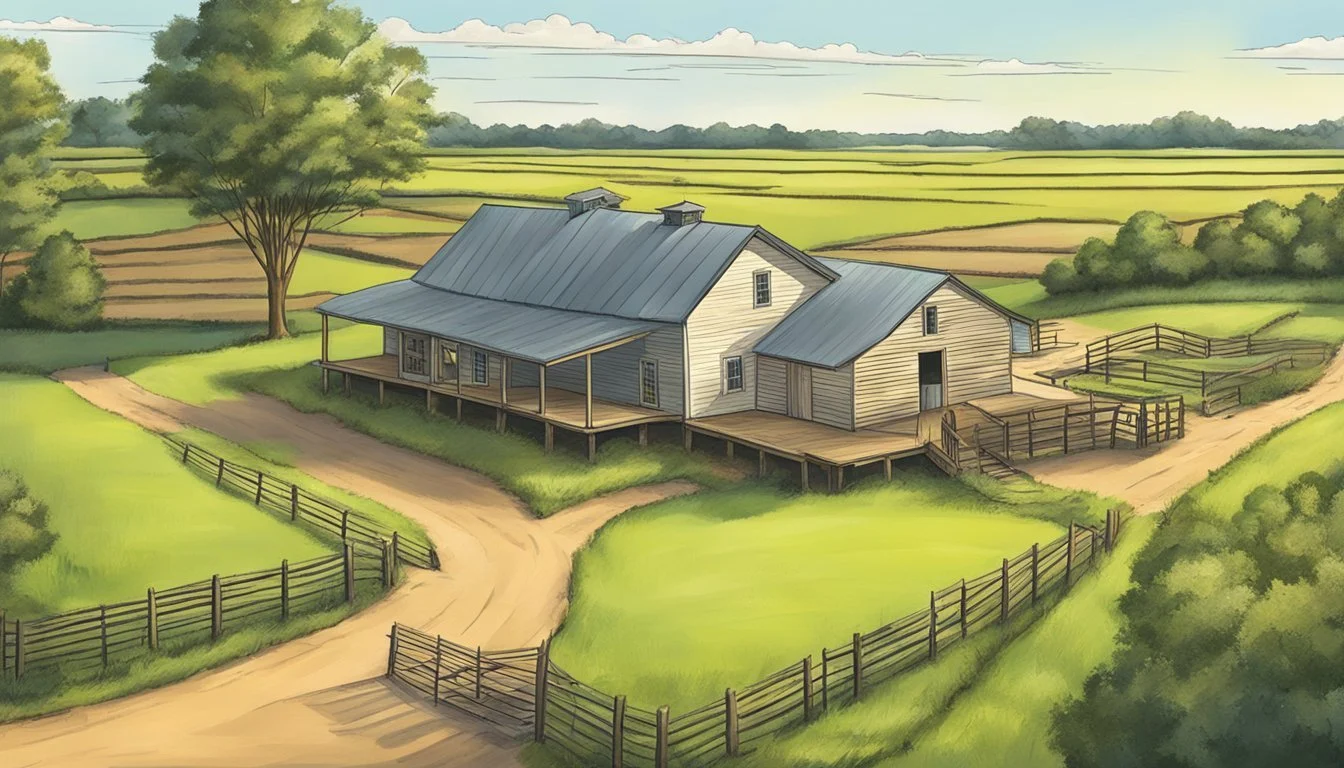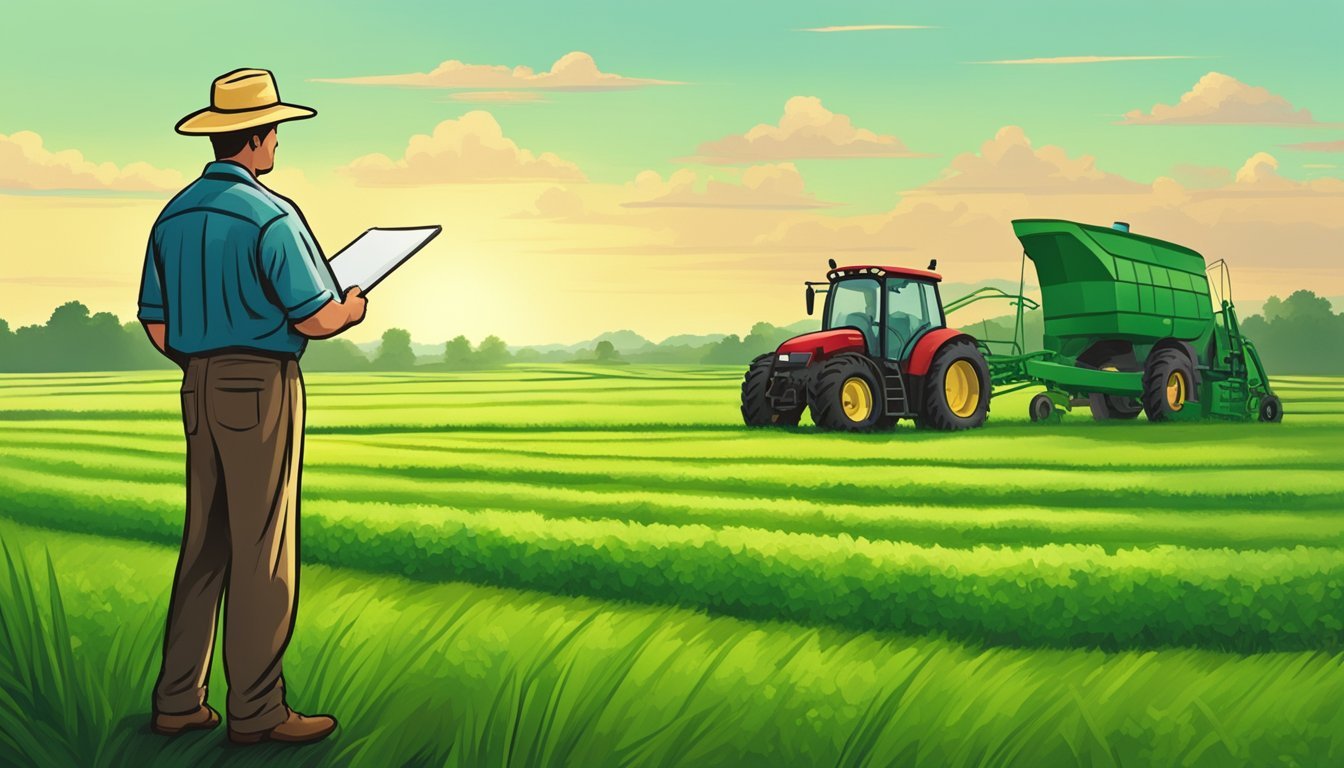Louisiana Farm Land for Lease
Opportunities and Options
This Article is Part of Our Guide on Navigating Agricultural Leases Across the US
Louisiana's agricultural sector offers a diverse range of leasing opportunities for those looking to engage in farming or ranching. The state's rich soil and subtropical climate create an advantageous environment for a variety of crops, including rice (how long does rice last?), soybeans, cotton, and sugarcane, as well as a thriving seafood industry along its coastline. With an array of land leases available, from small acreage plots to extensive farms, Louisiana presents potential lessees with numerous options to suit different scales of agricultural operations.
The leasing market in Louisiana is dynamic, providing flexible arrangements to accommodate the needs of both landowners and lessees. Whether interested parties are seeking short-term arrangements or longer tenures, the state's farmland rental landscape adjusts to meet the economic and agronomic conditions prevalent in the region. Land leases in Louisiana often include terms that allow for the responsible stewardship of the soil, ensuring that it remains fertile and productive for future generations of farmers.
Considering the state's commitment to agricultural innovation and sustainability, those leasing farmland in Louisiana can often benefit from supportive community networks and state-sponsored resources. This environment fosters a robust agricultural community where tenants can thrive, underpinned by a market that respects the heritage of Louisiana's farming tradition while looking forward to its evolution and growth.
Understanding Louisiana's Farmland Leasing Market
Louisiana's farmland leasing market is an integral part of the agricultural landscape. When it comes to leasing agricultural land, understanding the values and rates is crucial for both lessees and lessors. Land values and cash rents vary across the state, influenced by factors such as land use, fertility, and accessibility.
Land Use: In Louisiana, agricultural land commonly falls into three categories: cropland, pasture, and forestry. Each category has distinct leasing values and considerations.
Cropland: Leasing rates for irrigated cropland historically range from $81 to $97 per acre, while non-irrigated cropland varies from $66 to $67 per acre.
Pastureland: Average values reported at $2,905 per acre and cash rents at approximately $33 per acre, reflecting a moderate increase from the previous years.
Forestry: While specific leasing rates are not provided here, forestry land use is a significant part of Louisiana's agricultural sector and follows its own value trends.
Statewide Surveys: Surveys by LSU AgCenter and the USDA's National Agricultural Statistics Service provide data that is key for market transparency. They convey trends and yearly updates that are vital for making informed leasing decisions.
Rental Trends: Over the past two decades, there has been a notable rise in farmland rental rates, although current rates are not specified in the search results provided. It is important for lessees to keep abreast of these trends to ensure fair lease agreements.
In conclusion, participants in Louisiana's farmland leasing market benefit from understanding the factors that influence land values and rental rates. Access to up-to-date, region-specific information is essential for a fair and functional leasing environment.
Types of Farm Land Available for Lease in Louisiana
Louisiana offers varied types of agricultural land suitable for different farming activities, each possessing unique characteristics that cater to specific agricultural needs.
Crop Land
Louisiana's crop land is primarily fertile and diverse, supporting a wide range of agricultural crops. Leases are available across the state, including regions like Lubbock County and Randall County. This land typically benefits from Louisiana's warm climate and ample rainfall, making it suitable for growing commodities such as soybeans, cotton, corn, and wheat.
Location: Lubbock County, Randall County
Availability: Multiple lease options
Crops: Soybeans, cotton, corn, and wheat
Cattle Grazing Land
Cattle grazing lands are prominent in Louisiana, providing expansive areas for livestock. These lands often come with existing facilities for cattle operations, including fenced pastures and access to water. Leases in places like Beauregard Parish reflect Louisiana's commitment to supporting the cattle industry.
Location: Beauregard Parish
Features: Fenced pastures, water access
Use: Livestock grazing
Rice Production Areas
The state is also known for its rice production areas, with specific regions developed to optimize rice cultivation. These areas are engineered to manage water efficiently, critical for rice farming, and are found in low-lying regions that facilitate irrigation and flood management.
Special Requirements: Efficient water management systems
Irrigation: Designed for optimal water use
Crop: Rice
Lease Agreement Fundamentals
For anyone entering a lease agreement in Louisiana for farm land, understanding the essentials of the contract is critical. These agreements define the lease term, payment structure, and detail the responsibilities of the landowner and the lessee.
Lease Term Options
The duration of a farm lease can vary significantly depending on the agreement between the landowner and tenant. Common lease terms include:
Annual Leases: These typically run for one year and may renew automatically.
Seasonal Leases: Suited for crops that have a specific growing season.
Long-term Leases: These may last several years, providing stability for the tenant and consistent rental income for the landowner.
Payment Structures
Farm lease payments are structured in one of three ways:
Fixed Cash Rent: The lessee pays a set amount either on an annual or per-acre basis, regardless of farming success.
Land Type Price Range (per acre) Irrigated cropland $81 - $97 Non-irrigated crop $66 - $67 Pastureland $16 - $27
Variable Cash Rent: Rent is tied to commodity prices, yields, or a combination, offering more flexibility and potential risk-sharing.
Crop Share Rent: The landowner receives a percentage of the harvested crop in lieu of cash rent, aligning the landowner's income with crop yields.
Landowner and Lessee Responsibilities
Clear delineation of responsibilities is vital to avoid disputes:
Landowner: Must provide the lessee with access to the land and ensure that their rights to use the land for specified agricultural purposes are upheld.
Lessee: Typically responsible for day-to-day farming operations, including crop production or livestock care. They must maintain the land in accordance with the lease stipulations.
Both parties may agree to additional terms, such as allowing the lessee to earn credit towards the purchase of the land.
A comprehensive lease template can often be obtained in PDF format online, which can serve as a starting point for drafting an agreement. Some templates may be free, while others might require a credit card for download. It's imperative to comply with state-specific legal requirements when engaging in a Louisiana farm lease agreement to ensure that the contract is enforceable.
Navigating Real Estate Listings
In the quest for leasing farmland in Louisiana, potential lessees must know where to find listings and how to comprehensively assess them for making informed decisions.
Finding Listings for Louisiana Farmland
One can browse various online platforms to find available farmland for lease in Louisiana. Sites like LandSearch and National Land Realty offer tools to filter searches by location, price, and acreage. Other sources to consider include:
Local Real Estate Agents: They often have listings not available online.
Agricultural Magazines and Newspapers: These publications sometimes contain ads for farmland.
County Courthouse or Local Agricultural Offices: They can have bulletin boards with land listings.
Evaluating Listings and Conducting Research
Once a lessee has identified potential listings, they should evaluate them to determine suitability. Key factors include:
Lease Terms: Pay attention to lease duration, costs, and any restrictions.
Land Quality and Resources: Assess soil quality, water availability, and existing farm infrastructure.
Legal Considerations: Understand zoning laws and ensure compliance with state regulations.
They should also conduct thorough research, which may involve:
Visiting the farm to inspect it firsthand.
Consulting with local farmers or agricultural experts for insights.
Reviewing historical land use to gauge productivity and any potential issues.
Legal and Financial Considerations
When engaging in farm leases in Louisiana, one must navigate a number of legal and financial considerations to ensure a successful and legally compliant agreement. Attention to local regulations, insurance specifics, and liability are crucial for both landowners and tenants.
Understanding Local Zoning and Regulations
Local zoning laws dictate the use of agricultural land in Louisiana. Leases must comply with these regulations, which vary from parish to parish. Before signing a lease, both parties should confirm that their intended use of the land aligns with local land use plans and zoning requirements. A failure to do so can result in legal complications that disrupt farming operations.
Insurance and Liability
Both landowners and tenants should address insurance and liability in their lease agreements. Insurance typically covers property damage, crop loss, and personal injury, but policies and coverage can vary widely. It is advisable for both parties to carry their own insurance to protect against potential risks.
Landowners should maintain liability insurance to protect against claims that may arise from leasing their land.
Tenants need to ensure they have adequate coverage for operations, especially if they're using their own equipment or employing others.
A clear understanding of who is responsible for what in terms of insurance can prevent disputes and financial losses in the event of an accident or natural disaster. The lease should explicitly detail these responsibilities to avoid ambiguity.
Amenities and Resources
When considering leasing farm land in Louisiana, two critical factors that potential lessees must take into account are the accessibility to water resources and the availability of utilities and infrastructure. These features are essential for efficient agricultural operations.
Access to Water Resources
Adequate water supply is paramount for farming, and properties in Louisiana often have access to ample water resources. Many farm lands for lease may offer:
City Water: Availability of city water for irrigation and livestock.
Natural Water Resources: Presence of rivers, lakes, or aquifers nearby.
Utilities and Infrastructure
Farm land in Louisiana typically comes with established utilities and infrastructure, facilitating a smoother operation for lessees. Key components include:
Electricity: Reliable access to the power grid.
Road Access: Well-maintained roads for easy transport of goods and supplies.
A well-structured lease agreement will delineate the specific amenities and resources available on the property, ensuring lessees fully understand the utilities and infrastructure they can utilize.
Guide to Buying vs. Leasing
In Louisiana, farm land acquisition can be approached in two distinct ways: purchasing or leasing. Each option presents a unique set of benefits and considerations that must be assessed by prospective land users based on their long-term business goals and financial capabilities.
Pros and Cons of Farm Land Leasing
Pros:
Reduced Capital Requirement: Leasing requires less upfront capital than buying, allowing farmers to allocate funds to other aspects of their operations.
Flexibility: Tenants have the opportunity to relocate or adjust the scale of their farming activities without the long-term commitment of owning land.
Cons:
Lack of Equity: Lessees do not build equity in the land, as they would through purchasing, which could impact long-term financial growth.
Less Control: Leased land might come with restrictions set by the landowner, limiting the lessee’s autonomy over the use of the property.
Comparative Analysis with Buying Farmland
Buying:
Ownership Equates to Equity: Purchasing farm land in Louisiana is an investment that builds equity and can appreciate over time, benefiting the landowner's financial portfolio.
Full Autonomy: Owners possess complete control over the land, granting them the authority to make all management decisions and land alterations as desired.
Leasing:
Lower Initial Expense: When leasing, the initial financial requirement is significantly lower compared to the lump sum needed for purchasing land.
Operational Flexibility: Leases may offer more operational flexibility, as committing to a long-term mortgage is avoided. Moreover, leasing allows farmers to access land that may be otherwise unaffordable to purchase.
When considering farmland in Louisiana, individuals must weigh the immediate and long-term financial implications, as well as their personal motivations for land utilization, before deciding between leasing and buying.
Local County Information
When seeking farmland for lease in Louisiana, potential lessees can find a diverse range of options varying by county. Each parish—Louisiana’s term for counties—has its unique attributes influencing land value and rental rates.
Specifics by Louisiana Counties
Atoka County: This county has sizable farm lease offerings, like a reported 480 acres available for lease. The expansive land available in this county can suit extensive agricultural operations.
Johnson County: Typically includes farms with amenities suited for diverse agricultural projects. The county offers 35 acres of land available for various farming activities.
Lafayette Parish: Known for its agricultural friendliness, Lafayette Parish has multiple parcels of land available for lease. This includes plots of 6 acres and 4 acres, illustrating the range of small to medium-sized farms lessees can access.
Calcasieu Parish: Offers 0.75 acres near Sulphur, LA, suited more for specialized or intensive agricultural enterprises.
Orleans Parish: Located in New Orleans, land for lease such as 0.15 acres, caters to urban farming or specialized micro-farming practices.
Atascosa County: Prospective lessees can find smaller plots of around 5 acres, which may be apt for boutique farming or as an extension to existing agricultural operations.
The state average value of pastureland has seen an increase to $2,905/acre, with cash rents at approximately $33/acre. Therefore, it's important for those interested in leasing to consider the scale and type of agriculture they intend to pursue, alongside the county-specific market rates and land attributes.
Essential Tips for Prospective Lessees
When considering leasing farmland in Louisiana, prospective lessees should first assess the land quality and suitability for their agricultural needs. Soil fertility, drainage, and past crop performance influence the potential for successful cultivation. Lessees should also investigate any land use restrictions to ensure that their intended farming practices are permissible.
Documentation is crucial for a successful lease arrangement. Prospective lessees must insist on a written lease agreement that clearly outlines the terms, including the lease duration, rental payments (specified in per acre rates if applicable), and maintenance obligations. This contract should also address liability and insurance requirements to protect both the lessee and landowner.
Lessees should carefully consider the lease type. Options typically include:
Fixed cash rent
Flexible cash rent
Crop-share agreements
Custom farming agreements
Each type has implications for risk distribution and income predictability. Prospective lessees must understand these implications thoroughly.
Finally, communication with the landowner is a pivotal aspect of any land for lease agreement. Lessees should establish a transparent and ongoing dialogue to align on expectations and address any emerging issues promptly. This proactive approach can prevent misunderstandings and foster a mutually beneficial relationship.









